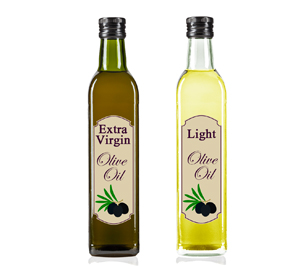 Turns out there’s a difference between olive oil and extra virgin olive oil. And it’s not just the price.
Turns out there’s a difference between olive oil and extra virgin olive oil. And it’s not just the price.
Yes, there is a cost difference. For the same size bottle, there can be a few dollars difference in price. The reason for the difference in price is that the two oils are made using different techniques and have different properties that lead to different uses.
Extra virgin olive oil is made from olives that have been pressed to extract their juices, without solvents or high temperatures. It is unrefined, thus its name “extra virgin.” It has a pungent, bitter, and fruity or grassy taste, depending on the olives used and the region in which the olives are grown. It is often darker in color than olive oil.
Olive oil or “light” olive oil is different. “Light” olive oil is not light in calories, but lighter in flavor. Light olive oil and regular olive oil are usually a blend of extra virgin olive oils and refined olive oils. Refined olive oils are usually made using chemicals and/or heat to remove flaws in the olives. A lighter-colored oil with a more neutral flavor is achieved.
One large difference between regular olive oil and extra virgin, besides the flavor difference, is the smoke point. The smoke point is the temperature at which the oil will burn (and usually ruin what you’re cooking). Olive oil, which has been more refined and blended, can withstand higher temperatures than pure oil. Regular or light olive oil has a smoke point of 486 degrees, whereas extra virgin olive oil has a lower smoke point around 410 degrees Fahrenheit.
So if you are using olive oil to cook your food you would be wise to use regular olive oil to achieve a higher temperature without burning the oil. And if you were using olive oil for a salad dressing, you would likely want to choose the more flavorful extra virgin olive oil. For gastric sleeve, gastric bypass, and lap band patients, cooking with oil should be done sparingly in order to limit extra calories to promote maximum weight loss. However, sometimes oil is needed in the cooking process. Opt for small amounts of olive oil and use cooking spray to help limit the calories. If you are making a spinach salad and need a dressing to drizzle on, try small amounts of extra virgin olive oil along with a dash of vinegar and an acid, like lemon, to brighten the salad. Dr. Shillingford’s patients are reminded to follow their post-op bariatric diet.
Dr. Shillingford, MD, PA, is a board-certified surgeon specializing in advanced laparoscopic and bariatric surgery. His gastric sleeve, gastric bypass, and gastric band patients receive top-notch care at Northwest Medical Center’s Center of Excellence in Bariatric Surgery, where he proudly serves as Medical Director. Follow up bariatric care is provided in Dr. Shillingford’s conveniently located Boca Raton office, which is easily accessible from Miami, Fort Lauderdale, West Palm Beach, Orlando, and even Naples.



